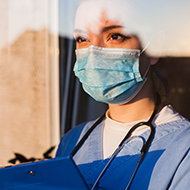
Association urges vets to use professional judgement when assessing cases
Following the announcement of new local and national lockdowns, the British Veterinary Association (BVA) has updated its guidance for members in England and Scotland.
The updated guidance for England states that veterinary practices are classed as essential businesses and can therefore stay open. The public are permitted to leave home to access veterinary services and advice. This is also the case in Scotland as confirmed by the Scottish government.
The guidance also urges practices to continue to work in COVID-safe ways. This includes strict social distancing between colleagues and clients, good hygiene practices and the use of PPE. The BVA is also advising veterinary practices to have colleagues work from home where possible.
The BVA's guidance asks veterinary professionals to exercise clinical judgement when deciding what constitutes essential animal health and welfare during lockdown. The association added that it may sometimes be appropriate to delay seeing an animal during the lockdown, and it recommends that professionals use the RCVS guidance to help with this assessment.
Finally, the association encourages veterinary practices to continue to support each other, and asked that those working across national borders are mindful of the rules on either side of the border.
BVA president James Russell expressed his approval at the government's continued recognition of the importance of veterinary services during these lockdowns. He went on to comment: “The latest guidance from BVA focuses on the clinical and professional judgement of our colleagues to assess whether and how clients can be seen safely, as well as considering whether they need to be seen in person.
“Over the last seven months the veterinary teams have worked incredibly hard to put safe working measures in place, including the use of remote consultations, so we are in a very strong position to get through the new lockdown measures.”



 The latest
The latest